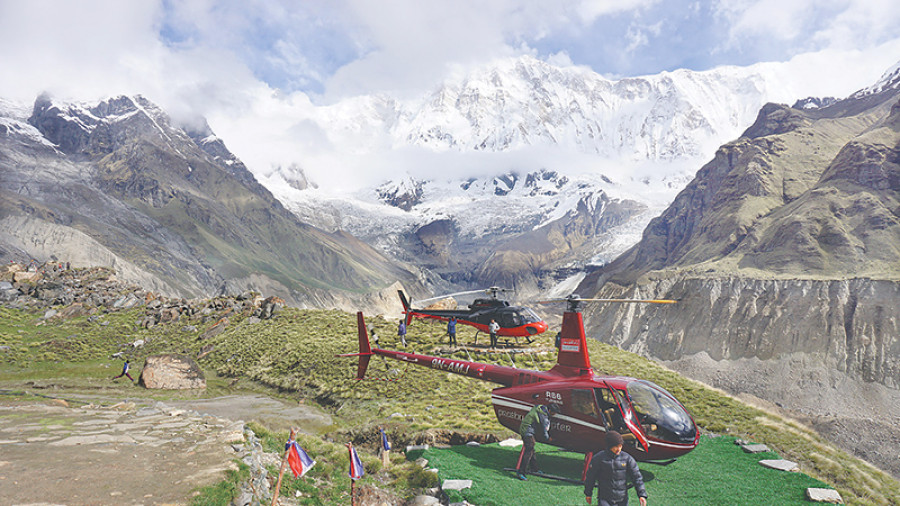Money
Global insurers threaten to stop cover for tourists
International insurance companies have warned the government that they will stop issuing travel insurance policies for tourists visiting Nepal from September 1 if it does not move to eliminate insurance fraud hatched by brokers in trekking and mountaineering agencies.
Sangam Prasain
International insurance companies have warned the government that they will stop issuing travel insurance policies for tourists visiting Nepal from September 1 if it does not move to eliminate insurance fraud hatched by brokers in trekking and mountaineering agencies.
Recently revealed insurance scams involving bogus helicopter rescues and hospital treatment of tourists have rocked the tourism industry and embarrassed the government.
“Since your [Nepal government] investigation commenced on May 30, until August 1, our company has stopped 61 fraudulent helicopter rescues from happening, that’s one every two days,” said Danny Kaine, head of Assistance for Travellers Assist, a UK-based medical assistance company representing international insurers in Nepal, in an email to the Tourism Ministry, a copy of which was obtained by the Post.
“And that’s just the result of our company. Imagine how many other companies are experiencing this same problem. The situation is out of control, and I believe that from the inside you don’t quite see how the fraud is happening and to what scale,” he said in the email dated August 9.
“In 21 days, our clients, who provide travel insurance for over 70 percent of the English-speaking travelers who visit Nepal, will stop issuing travel insurance policies for Nepal. In addition, we are working with the governments of the UK, Australia, New Zealand, the US and Canada on the issues,” he added.
In another email, Kaine said that three major insurance underwriters from the UK, Australia and the US held urgent meetings to discuss the possibility of cancelling all the travel insurance policies for British, Australian and American tourists who visit Nepal.
“This is due to fraudulent helicopter rescues that are happening throughout Nepal and overtreatment that is happening in some hospitals that is costing insurance companies millions of dollars every year. For the past six months, our company has conducted several investigations into past travel insurance claims, and we have found that up to 30 percent of helicopter rescues that happen are completely unnecessary,” he said.
The insurance companies have demanded that helicopter rescue costs be capped at $4,000 per flight. “If there is less money, the helicopter companies are less likely to want to share their profits with trekking companies and hospitals that will drastically reduce the amount of fraud,” Kaine.
“Fake rescue is obviously a matter of concern for us, and we have recommended stern action against all the companies involved in it,” said Tourism Secretary Krishna Prasad Devkota.
“We have sent the investigation report to the ministries and departments concerned like the Home Ministry, the Central Investigation Bureau, the Department of Revenue Investigation, the Civil Aviation Authority of Nepal and others suggesting action as per the crime committed,” he said, adding that the government would prepare a guideline within next week on how rescues can be done.
“We will not leave any stone unturned to punish the agencies and people involved in fraud that has dented Nepal’s reputation.”
On July 30, a government fact-finding committee submitted a 700-page probe report to Tourism Minister Rabindra Adhikari recommending that from the next tourist season (September-November) all rescue activities be entrusted to the Nepal Police to stop the insurance scam that has damaged the country’s reputation.
The committee report has urged the government to investigate the transactions of eight travel, trekking and rescue agencies named Kailash Charter Rescue, Alpine Rescue, Mountain Heli Charter Service, Eagle Heli Charter Service, Easy Heli Charter Service, Flight Connection Domestic, Mountain Rescue Service and Himalayan Social Journey Trekking.
Four hospitals Swacon International Hospital, Era Health Centre, CIWEC Hospital and Vayodha Hospitals and three helicopter companies Heli Everest, Manang Air and Air Dynasty Heli Services are being scrutinised by the government for quoting exorbitant rates and making claims against tourist insurance policies.
The committee suspects that they may be involved in tax evasion too. The fact-finding panel probed 10 helicopter companies, six hospitals and 36 travel, trekking and rescue agencies following complaints filed by tourism entrepreneurs.
Unscrupulous operators have been pocketing thousands of dollars from insurance companies by making multiple claims for a single chopper ride or pushing trekkers to agree to airlifts for minor illnesses.
Trekking companies get hefty kickbacks when hikers are evacuated from the mountains.
The committee said in its report that there have been widespread complaints of dishonest companies serving adulterated food to make tourists sick so that they can be evacuated by helicopter, and they can receive commissions from helicopter companies and hospitals and clinics.
According to the report, a local agent was found billing the insurance company 50,000 Euros ($57,972) for evacuating a group of trekkers. In another case, they found that a local agent issued two separate bills for one rescue. The insurance company was billed 86,248 euros. The insurance company was billed $24,000 for minor treatment in a hospital.




 9.83°C Kathmandu
9.83°C Kathmandu















